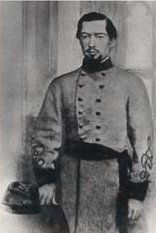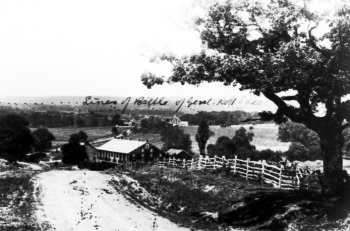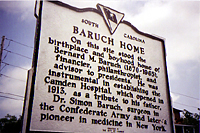Confederate surgeon Simon Baruch
11 December 2006

This is Assistant Surgeon Simon Baruch (‘ba-rook’) of the 3rd South Carolina Battalion. I found him by following a thread in a CW Society post, part of their recent conversation about Jewish Confederates. Among those prominent in that service it mentioned
… Nahum Baruch, the father of financier Bernard Baruch, was a doctor and Colonel in Barksdale’s Mississippi Brigade. He was present at Gettysburg.
As is my wont, I saw the thread sticking out and gave it a yank. Who was this Nahum?
It turns out this Baruch was not Nahum, actually. Nor a Colonel, though he ended the War in Barksdale’s famous Brigade. He did have a successful son, was a doctor, and was at Sharpsburg and that other northern battle, too. There’s lots more to his story.
From Schwersenz, east of Posen, then part of Prussia (now Poland), Simon Baruch came to South Carolina in 1855 at 15 years of age. He was, perhaps, worried about conscription into the Prussian Army, but equally likely, about his economic future. He joined the household of Mannes Baum who had emigrated from Schwersenz some five years before, and worked as a bookkeeper in the family store in Camden.
About 1860 the Baums sent him to South Carolina Medical College and then the Medical College of Virginia, Richmond. Simon graduated with an M.D. in early 1862 and accepted a commission as Assistant Surgeon of the 3rd South Carolina Battalion on 4 April of that year. He reportedly said he had entered the service “without even having lanced a boil.”
His Battalion was assigned to Virginia and saw their first action near Yorktown that same month. They fought with General Lee’s Army of Northern Virginia in Drayton’s and Kershaw’s Brigades, seeing combat at Second Manassas, on the Maryland Campaign, at Fredericksburg, Chancellorsville, Gettysburg, in the Wilderness, and at Spottsylvania Courthouse.
In August 1864 Baruch transferred to the 13th Mississippi Infantry Regiment and was appointed full Surgeon to date from 18 July. He probably served with that unit for the rest of the War.
By then, Dr Baruch would have had considerable surgical experience. The 3rd Battalion was hard hit in two battles in particular: at Fox’s Gap on South Mountain during the Maryland Campaign, and at Gettysburg, Pennsylvania.
On 14 September 1862, Drayton’s Brigade, part of Longstreet’s Command, was thrown into Fox’s by General D.H. Hill in a desperate defense against the assault of Federal General Reno’s IX Corps. The Battalion was severely damaged that day, suffering about 50% casualties, providing strenuous work for the surgeon in treating those wounded men who were not left behind on the battlefield.


Gettysburg Field Hospital, 1863
(Confederate Relic Room and Museum, Columbia, South Carolina)
The following July they were at Gettysburg, where Baruch was assigned to McLaws’ Division hospital in the Black Horse Tavern (site above). As he described it
All day and night the work continued at the field hospital, and throughout the following day also the wounded came pouring in, many on foot, among them several captured Union soldiers, on two of whom I operated. The field hospital contained now 222 seriously wounded men, 10 orderlies, and 3 surgeons.
Baruch and the other hospital staff remained behind with the wounded when the Confederate Army retreated on 4 July 1863, and surrendered to the Federals at 7 a.m. on the 5th. He continued to treat the wounded there for about six weeks, and was then imprisoned at Fort McHenry in Baltimore. He was paroled in October and returned to his unit in December.
At some point following, probably in the Spring of 1864, Baruch was relieved or resigned his commission on account of health, but he was back in service by summer and served as Surgeon for the duration with the 13th Mississippi Regiment.

state historical marker, from Jewish tour of the Carolinas
Afterward, he returned to Camden and was in practice as a physician. There he married Isabelle (Belle) Wolfe, a niece of his benefactor, Mannes Baum. He also organized the South Carolina Medical Society and was president of the State Board of Health.
Baruch practiced medicine in South Carolina for the next 16 years but was increasingly dissatisfied with the indiscriminate use of unproven remedies which, as often as not, did more visible harm than good. His studies brought him to appreciate the healing philosophies of the Austrian physician, Vincent Priessnitz [1799-1852], who had established a successful therapeutic spa in the Silesian mountains. Preissnitz employed therapies largely confined to the use of water for frequent bathing and irrigating the gastrointestinal tract. His patients recuperated in a restful, tranquil environment, ate a prudent diet with neither alcohol nor tobacco, and were encouraged to exercise. He called his alternative form of medicine, hydrotherapy … (from Aronson)
Apparently not content with his rural practice or the trends in modern medicine, Dr Baruch moved his family to New York City in 1881, where he practiced on West 57th Street and became a force in the public health causes of bathing and hydrotherapy:
Although in Europe public baths had been made available since the early nineteenth century and in this country public plunge (swimming) pools were relatively commonplace in some of the larger cities, it was not until the 1890s that attempts to establish municipally-sponsored bath houses were to meet with governmental approval. One of the first pleas for their establishment was made by Dr. Simon Baruch of New York and appeared in an 1889 editorial in the Philadelphia Medical Times and Record …(from Philipse Manor Hall, Yonkers)
Even in New York, though, the Baruchs remained strong Southerners
Mrs. Baruch became a member of the United Daughters of the Confederacy, and the couple raised their children with pro-Southern views. If a band struck up “Dixie,” Dr. Baruch would jump up and give the Rebel yell, much to the chagrin of the family. A man of usual reserve and dignity, Dr. Baruch nevertheless would let loose with the piercing yell even in the Metropolitan Opera House … (from Mandes)

Simon Baruch (after 1890, from CUNY)
Son Bernard Mannes (1870-1965), a rather more famous Baruch, went on to a very profitable career on Wall Street, and became a financial advisor to US Presidents from Woodrow Wilson to Harry Truman.
He is credited, among many other things, with coining the term Cold War to describe the US-Soviet conflicts, and with one of my all-time favorite quotes
If all you have is a hammer, everything looks like a nail.
His vast fortune enabled him to donate and endow university chairs, medical facilities, and other philanthropies, many in his father’s name. Between these gifts and the work of various civic organizations recognizing his achievements, Simon Baruch’s name will probably outlive all of us.
Examples of Simon Baruchisms in America today:
- Baruch Playground, NYC
- Simon Baruch Houses, public housing project, NYC
- Mrs Simon Baruch University Award – history prize from the UDC
- Buildings, halls, and chairs at Columbia University, Clemson University, New York University’s College of Medicine, and the Medical College of Virginia/VCU
- Simon Baruch Middle School, NYC
_______________
Myth or Fact?
Simon Baruch is credited in a number of places with having been on “General Lee’s staff”: there’s no evidence of that. He’s also occasionally mentioned, in family and neighborhood lore, as being Surgeon General of the Confederacy. There’s no evidence of that, either. There were only two of those; David C DeLeon and Samuel P Moore.
Many interweb pages cite Dr. Baruch as the first to successfully perform surgery for appendicitis. This is probably not true:
The first report of an appendectomy came from Amyan, a surgeon of the English army. Amyan performed an appendectomy in 1735 without anesthesia to remove a perforated appendix. Reginald H. Fitz, an anatomopathologist at Harvard who advocated early surgical intervention, first described appendicitis in 1886. Because he was not a surgeon, his advice was ignored for a time. Then, at the end of the 19th century, the English surgeon H. Hancock successfully performed the first appendectomy in a patient with acute appendicitis … (from eMedicine)
He’s also mentioned as an active member of the Ku Klux Klan in the years immediately following the Civil War. This is most often stated in websites and literature which also promote the International Zionist Conspiracy theory, among whose favorite targets is Bernard Baruch, which is suspicious. Membership in the KKK is plausible, but I don’t know for sure.
_______________
Notes
For much more about the doctor see
- Patricia Spain Ward, Simon Baruch: rebel in the ranks of medicine, 1840-1921, Tuscaloosa and London: University of Alabama Press, 1994
- Stanley M. Aronson, MD, The Bathhouses of Manhattan, Medicine & Health\Rhode Island, Vol. 89 No. 4 (April 2006 pdf)
- Thomas C. Mandes, Blacks, Jews fight on side of the South, The Washington Times, June 15, 2002 (transcribed)
The portrait of Simon on this page is from the collection of the Camden Archives and Museum. It was used on the cover of the Ward book. Legend has it that Belle Wolfe, later Simon’s wife, painted him in 1862. Perhaps this is that piece.
The photograph taken at Gettysburg, above, is from an online exhibit of the Libraries of the University of North Carolina, and has scrawled on its face handwritten notes concerning Dr Baruch’s role there. I’ve attempted a transcription here (top to bottom):
“lines of battle of Gen Robt E Lee”
“Barn and Tavern which Dr Baruch ___ed after the battle by direction of Gen Lee”
“spot where Dr Baruch surrendered the hospital to the advance guards July 5th, 1863 7 a.m.”
“site of hospital of McLaws Division, Longstreet’s …”
… and on the mat: “Presented by Mrs Simon Baruch” and “S Baruch MD, Asst Surg 3d SC Battalion, Kershaw Brigade, McLaws Division”


December 28th, 2006 at 7:31 pm
Dr. Baruch complained to his Union captors concerning the shelling his field hospital had taken during the battle of Gettysburg, including pointing out the various shell holes in the flag waving above the structure, noting ” you know damn well this was a hospital”
December 28th, 2006 at 10:59 pm
Hi Daigeaun,
This is a nice tidbit, thanks for posting it. Do you have a good source on the doctor? This sounds like something from contemporary correspondence …
January 12th, 2007 at 1:47 pm
thank you very much, there arent a lot of webistes about Simon Baruch, but more of his son, bernard baruch anyways this website is very helpful and i just want to thank you again!
January 12th, 2007 at 1:47 pm
Thank you for having so much information on Simon Baruch. This website helped me with my Simon Baruch project a lot! Thank you so much!
January 12th, 2007 at 4:24 pm
Thank you for the gracious notes, Alexa and Madison. You’re most welcome. Good luck with your projects. You too, Bobo, though your comment didn’t make it through the filter!
April 21st, 2008 at 3:06 pm
Bernard Baruch says in his book “My Own Story” that his dad was a member of the KKK in SC.
April 23rd, 2008 at 9:13 am
Thanks for finding that, Jefferson.
May 15th, 2008 at 10:02 am
i have a question, if a confederate surgeon found a union soldier, wounded, would he operate?? i am doing a social studies project
May 15th, 2008 at 12:20 pm
Hi Jake,
Short answer: yes. The same was true for Federal surgeons. I’ve read a number of anecdotes of this nature. The wounded enemy are usually POW when presented for care, and policy was to treat well. There are also complaints in the literature of unequal or delayed medical treatment of prisoners, but I don’t get the sense that was the norm.
April 26th, 2010 at 4:49 pm
trying to find out family history…do you know anything about the father of simon baruch, or uncles on father’s side…did any go to england?
May 5th, 2010 at 5:08 am
What a great personality were MR.Simon Baruch and son Bernard Mannes who was the financial advisor to US presidents? Do U have more info on such great personalities that have been Financial Advisor Colombia SC?
August 1st, 2010 at 12:56 am
Nicely done. I would still like to know why he chose the 13th Mississippi to transfer to?
August 3rd, 2010 at 6:04 pm
[…] but that didn’t quench his Southern pride, according to his son Bernard who is quoted in this nicely-balanced […]
December 27th, 2010 at 7:41 pm
O que é Teste de BAruch? Foi criado por Simon Baruch fazendo experiências na pele.
January 4th, 2011 at 1:32 pm
Did Simon Baruch do human experimentation in Saratoga
January 15th, 2011 at 2:13 pm
Hi Ron,
I don’t have any knowledge of this, and a quick search didn’t turn up any more than the brief mention of him at the Saratoga Spa Park page. For the benefit of our readers, I’ll excerpt here the background you gave me by email on the subject, and we’ll hope someone will weigh in:
Thanks for the intriguing question!
May 29th, 2011 at 7:19 am
Thanks for the interesting article about my great great great great grandfather.
September 7th, 2011 at 4:07 pm
[…] http://behind.aotw.org/2006/12/11/confederate-surgeon-simon-baruch/√Ǭ† […]
March 15th, 2012 at 7:47 pm
Simon Baruch is often credited as the guiding hand behind the New York State confiscation of the private wells and springs that now make up Saratoga Spa State Park. He was indeed a great proponent of the benefits of hydrotherapy and mudbaths, and he did loudly complain to the town of Saratoga Springs that their mineral springs were being depleted and ill-used by carbonic-gas and mineral-water bottlers. However, the actual confiscation of the private wells came about because of a series of lawsuits by private parties between 1909 and 1911 (one big case went to the US Supreme Court). Finally, Baruch died in 1921, while the grandiose neo-Classical bathhouses of the Park were not built till the 1930s. Baruch is a sort of mascot of hydrotherapy, but he was not a prime mover in the making of the Spa.
December 26th, 2012 at 11:21 pm
@ Josh sounds like we are related. Simon Baruch’s nephew, Edgar Baruch, is my great grandfather. Thanks so much for the information!
January 28th, 2018 at 5:48 pm
In Bernard Baruch’s biography he told the writer about he and his brother finding his father Simon’s kkk robes in an attic trunk and feeling proud. Stop trying to cover up this monster’s history.
January 28th, 2018 at 5:49 pm
I forgot to add the URL for the google page of the page in Bsruch’s authorized biography confirming his kkk ties, here it is https://books.google.com/books?id=A5bfknd-WcQC&pg=PA7&lpg=PA7
February 1st, 2018 at 11:34 pm
Thanks for the link, Becky. Another commenter above noted Bernard’s Memoir as source for Simon’s membership in the KKK, also. Perhaps that’s where Mr. Grant got he story?